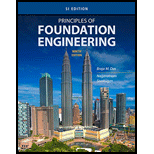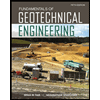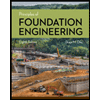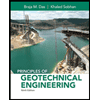
Principles Of Foundation Engineering 9e
9th Edition
ISBN: 9781337705035
Author: Das, Braja M.
Publisher: Cengage,
expand_more
expand_more
format_list_bulleted
Concept explainers
Question
Chapter 18, Problem 18.14P
To determine
Design and sketch a continuous anchor.
Expert Solution & Answer
Want to see the full answer?
Check out a sample textbook solution
Students have asked these similar questions
The rectangular gate shown in figure rotates about an axis through N. If a=3.3 ft,b=1.3 ft, d=2 ft, and the width perpendicular to the plane of the figure is 3 ft, what torque(applied to the shaft through N) is required to hold the gate closed?
An elevated tank feeds a simple pipe system as shown. There is a fire hydrant atpoint C. The minimum allowable pressure at point C is 22 psig for firefighting requirements.What are the maximum static head (in ft) as well as pressure (in psig) at point C (i.e. nodischarge in the system)? Do we meet the pressure requirement for firefighting? (Please donot worry about L or d in the figure below)
12. For the beam loaded and supported as shown, determine the following using Point Load Analogous via
Integration:
a. the rotation at the left support.
b. the deflection at midspan
R1
1 . m
600 N/m
3 m
+
2 m
R2
Chapter 18 Solutions
Principles Of Foundation Engineering 9e
Ch. 18 - Refer to Figure 18.9. A cantilever sheet pile is...Ch. 18 - Prob. 18.2PCh. 18 - Prob. 18.3PCh. 18 - Refer to Figure 18.13. Given L1 = 1.5 m, L2 = 3 m;...Ch. 18 - In Problem 18.4, find the maximum bending moment...Ch. 18 - Prob. 18.6PCh. 18 - Prob. 18.7PCh. 18 - Prob. 18.8PCh. 18 - Refer to Figure 18.23. Given L1=3m, L2=6m,...Ch. 18 - Prob. 18.10P
Knowledge Booster
Learn more about
Need a deep-dive on the concept behind this application? Look no further. Learn more about this topic, civil-engineering and related others by exploring similar questions and additional content below.Similar questions
- 14. Find the reaction R and the moment at the wall for the propped beam shown below using Point Load Analogous via Integration: 16 kN/m 000 4.5m 4.5marrow_forward13. Determine the moment at supports A and B of the fixed ended beam loaded as shown using Point Load Analogous via Integration: 10 kN/m 9 kN/m 3 m 3 m 12 kN/marrow_forwardHow does construction estimate inaccuracies lead to delays and complications that impact projects?arrow_forward
- Q5: Given the following system: น -3 y= [4 -2] +3u Generate a model with states that are the sum and difference of the original states.arrow_forward4. Draw a stress-strain curve (in tension and compression) for a reinforced concrete beam below. Label the important parts of the plot. Find the linear elastic approximation obtained using the transformed technique, and plot over the same strain ranges. 24" 4" 20" 16" f = 8,000 psi 8- #11 bars Grade 60 steel 4" (f, = 60 ksi and E₁ = 29000 ksi)arrow_forwardWhy is Historical Data important compared to other sourses of information when estimating construction projects?arrow_forward
- Need help, please show all work, steps, units and round to 3 significant figures. Thank you!!arrow_forwardNeed help. Find the answer to the boxes marked in red. Thanks!arrow_forwardFor the gravity dam shown in the figure, The following data are available: -Unit weight of concrete (Yconc) = 2.4 ton/m³ -Vertical upward earth quake factor (K,) = 0.1 -Neglect Wave pressure, silt pressure and ice force μ=0.65 a-Find heel and toe stresses (Pmin & Pmax) b-Is this structure safe against tension? c-Find the factor of safety against sliding and overturning (F.S, & F.Sover) 165 m 160 m t 10 m T I 4 m 50 100 marrow_forward
- For the gravity dam shown in the figure, The following data are available: -Unit weight of concrete (Yeone) 2.4 ton/m³ Vertical down ward earth quake factor (K,) = 0.1 Neglect Wave pressure, silt pressure and ice force The wind velocity (V)-45 Km/hr Straight length of water expanse (F) 75 Km =0.7 14-70m 3h T a- Find the factor of safety against sliding and overturning (F.Slid F.Sover) b- Find the toe and heel stresses (hma, and hmin.) c-Check tension. 8marrow_forwardQUESTION 2-(40 Points) In the case where other information is given in the figure, the wall is under the effect of a uniform lateral wind load of 0.7 kN/m2. Since the foundation is sized according to the safe bearing capacity of the soil and the safe bearing capacity remains the same, find the width of this foundation asymmetrically (with uniform base pressure). Draw the vertical section of the wall of the asymmetric foundation and write its dimensions and values on it. Draw the T and M diagrams along the width. The foundation thickness is the same in both cases. q=0.7 kN/m2 5 m R Duvar Nd=Wd 0.7 m T K 0 0.6 0.5 1.7 m Yb-24 kN/m3 0.6 m T + foundationarrow_forwardCan you pls. Explain on how to get "BETA T" and "BETA C" on this study about VALUE OF TRAVEL TIME.arrow_forward
arrow_back_ios
SEE MORE QUESTIONS
arrow_forward_ios
Recommended textbooks for you
 Fundamentals of Geotechnical Engineering (MindTap...Civil EngineeringISBN:9781305635180Author:Braja M. Das, Nagaratnam SivakuganPublisher:Cengage Learning
Fundamentals of Geotechnical Engineering (MindTap...Civil EngineeringISBN:9781305635180Author:Braja M. Das, Nagaratnam SivakuganPublisher:Cengage Learning Principles of Foundation Engineering (MindTap Cou...Civil EngineeringISBN:9781337705028Author:Braja M. Das, Nagaratnam SivakuganPublisher:Cengage Learning
Principles of Foundation Engineering (MindTap Cou...Civil EngineeringISBN:9781337705028Author:Braja M. Das, Nagaratnam SivakuganPublisher:Cengage Learning Principles of Foundation Engineering (MindTap Cou...Civil EngineeringISBN:9781305081550Author:Braja M. DasPublisher:Cengage Learning
Principles of Foundation Engineering (MindTap Cou...Civil EngineeringISBN:9781305081550Author:Braja M. DasPublisher:Cengage Learning Principles of Geotechnical Engineering (MindTap C...Civil EngineeringISBN:9781305970939Author:Braja M. Das, Khaled SobhanPublisher:Cengage Learning
Principles of Geotechnical Engineering (MindTap C...Civil EngineeringISBN:9781305970939Author:Braja M. Das, Khaled SobhanPublisher:Cengage Learning

Fundamentals of Geotechnical Engineering (MindTap...
Civil Engineering
ISBN:9781305635180
Author:Braja M. Das, Nagaratnam Sivakugan
Publisher:Cengage Learning

Principles of Foundation Engineering (MindTap Cou...
Civil Engineering
ISBN:9781337705028
Author:Braja M. Das, Nagaratnam Sivakugan
Publisher:Cengage Learning

Principles of Foundation Engineering (MindTap Cou...
Civil Engineering
ISBN:9781305081550
Author:Braja M. Das
Publisher:Cengage Learning

Principles of Geotechnical Engineering (MindTap C...
Civil Engineering
ISBN:9781305970939
Author:Braja M. Das, Khaled Sobhan
Publisher:Cengage Learning